剑桥国际英语教程(入门级)4单元(全)
- 格式:ppt
- 大小:327.00 KB
- 文档页数:18
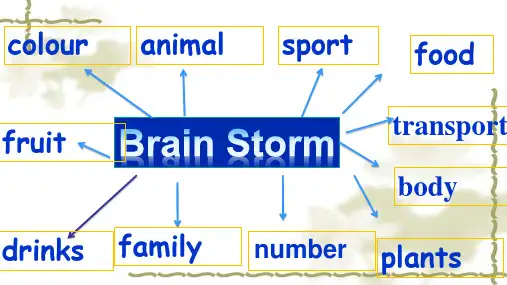
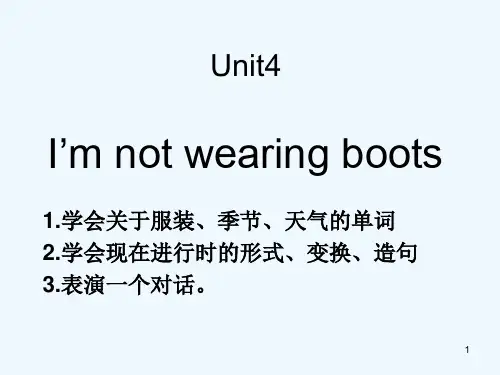
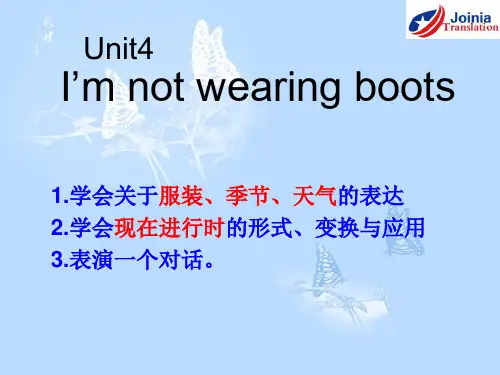
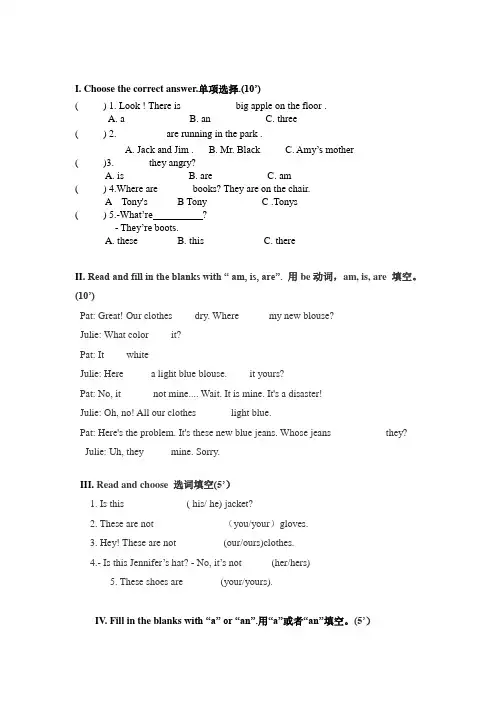
I. Choose the correct answer.单项选择.(10’)( ) 1. Look ! There is __________ big apple on the floor .A. aB. anC. three( ) 2. _________ are running in the park .A. Jack and Jim .B. Mr. BlackC. Amy’s mother( )3. ______ they angry?A. isB. areC. am( ) 4.Where are ______ books? They are on the chair.A Tony'sB TonyC .Tonys( ) 5.-What’re?- They’re boots.A. theseB. thisC. thereII. Read and fill in the blanks with “ am, is, are”. 用be动词,am, is, are 填空。
(10’)Pat: Great! Our clothes ____dry. Where _____ my new blouse?Julie: What color____ it?Pat: It____ whiteJulie: Here _____a light blue blouse. ____it yours?Pat: No, it ______not mine.... Wait. It is mine. It's a disaster!Julie: Oh, no! All our clothes ______ light blue.Pat: Here's the problem. It's these new blue jeans. Whose jeans _________they? Julie: Uh, they_____ mine. Sorry.III. Read and choose 选词填空(5’)1. Is this ____________( his/ he) jacket?2. These are not ____________(you/your)gloves.3. Hey! These are not _________(our/ours)clothes.4.- Is this Jennifer’s hat? - No, it’s not______(her/hers)5. These shoes are _______(your/yours).IV.Fill in the blanks with “a” or “an”.用“a”或者“an”填空。
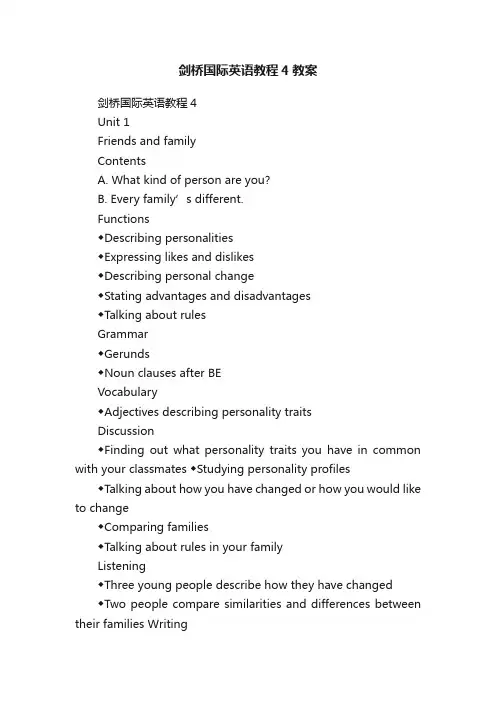
剑桥国际英语教程4教案剑桥国际英语教程4Unit 1Friends and familyContentsA. What kind of person are you?B. Every family’s different.Functions◆Describing personalities◆Expressing likes and dislikes◆Describing personal change◆Stating advantages and disadvantages◆Talking about rulesGrammar◆Gerunds◆Noun clauses after BEVocabulary◆Adjectives describing personality traitsDiscussion◆Finding out what personality traits you have in common with your classmates ◆Studying personality profiles◆Talking about how you have changed or how you would like to change◆Comparing families◆Talking about rules in your familyListening◆Three young people describe how they have changed◆Two people compare similari ties and differences between their families Writing◆Identifying the main idea in a paragraph◆Writing a paragraph about your most positive or negative qualityReading◆“upside-down families”: families where the children have too much controlUnit 2Educations and learningContentsA How can schools be improved?B What’s the best way to learn?Functions◆Stating facts◆Making recommendations◆Describing processes and strategies◆Giving reasons and purposes◆Talking about hopes and dreamsGrammar◆Should and ought to in the active and passive \◆Infinitives and gerunds to talk about how to do things◆In order to and so thatVocabulary◆Collocations relating to goalsDiscussion◆Making suggestions to improve schools◆Explaining how school prepares young people for life◆Stating your goals for the future◆Discussing different ways to learn somethingListening◆Two young people explain how they developed personallyat college◆Three people describe the strategies they used to learn something newWriting◆Choosing topic sentences◆Writing a paragraph about your educational beliefsReading◆“Home Schooling: A growing trend”: advantages and drawbacks of educatingchildren at homeUnit 3CitiesContentsA. Fascinating destinationsB. It’s my kind of cityFunctions◆De scribing and giving information about places◆Stating preferences◆Presenting contrasting information◆Categorizing and evaluating issuesGrammar◆Defining and non-defining relative clauses◆Order of adjectives◆Connecting contrasting ideasVocabulary◆Nouns referring to features of a city◆Nouns relating to quality-of-life issuesDiscussion◆Explaining why you would like to visit a particular city◆Choosing the right city for a particular purpose◆Deciding which city is best to live in◆Evaluating your hometown◆Discussing quality-to-life issuesListening◆ A TV show introduces two exciting cities◆Two foreign students explain what they like about their host city◆Two New Yorkers talk about life in their cityWriting◆Creating topic sentences◆Writing a paragraph about a place you knowReading“Get Yourself Lost”: The best way to enjoy sight-seeing in a new placeUnit 3Day and nightContentsA. Your energy profileB. Sweet dreamsFunctions◆Describing daily routines and habits◆Giving advice◆Explaining reasons and conditions◆Giving interpretations of meaningGrammar◆Time relationships◆Clauses stating reasons and conditionsVocabulary◆Collocations referring to sleep and dreamsDiscussion◆Discussing personal energy levels◆Classifying activities that raise or lower your energy level◆Giving advice on a radio call-in program◆Talking about sleeping habits◆Interrupting dreamsListening◆Three people describe methods they use to lower stress◆Two people describe their dreams and try to figure out what they mean Writing◆Choosing the best topic sentence◆Writing a paragraph about times of day, daily schedules, or relaxation. Reading“Ten Keys to a Better Night’s Sleep”: Tips on fulfilling a basic human needUnit 5Generally speakingContentsA. What is typical?B. Topics of concernFunctions◆Comparing customs and habits◆Presenting contrasting information◆Making generalizations◆Discussing concerns and offering solutions◆Describing a mental processGrammar◆Showing contrast and exception◆Quantifiers◆Conditional sentencesVocabulary◆Adjectives describing emotional reactions◆Nouns referring to public concernsDiscussion◆Talking about what’s advantage◆Discussing what makes you typical or unique◆Talking about future concerns◆Explaining your persona l concernsListening◆Three teenagers compare themselves to other people their own age◆Three people describe their different approaches to solving problemsWriting◆Identifying supporting statements◆Developing a paragraph with supporting statementsReading“Statistically Speaking”: the living arrangements, education level, and beliefs of the average American Unit 6Interpersonal communicationContentsA. Making conversationB. Personal secretsFunctions◆Describing types◆Talking about appropriate behavior◆Starting a conversation◆Making small talk◆Reporting what someone else has saidGrammar◆Infinitive and gerund phrases◆Reported speechVocabulary◆Adjectives describing positive and negative feelings Discussion◆Describing conversational styles and habits◆Giving advice for awkward social situations◆Determining appropriate topics for small talk◆Deciding if it is appropriate to tell secrets◆Reporting new about your classmatesListening◆Several people make small at a party◆Three people tell s ome interesting newsWriting◆Keeping a journal◆Writing your reaction to a good piece of news Reading“Don’t Be a Bore!”: How to be a good conversationalist.Unit 7Telling the newsContentsA. StorytellingB. What’s in the news?Functions◆Presenting information in chronological order◆Narrating news events◆Organizing and presenting topical information Grammar◆Adverbs with the past and past perfect◆Present perfect vs. past◆Past vs. past continuousVocabularyNouns referring to events in the newsDiscussion◆Telling stories about uncomfortable situations◆Talking about personal experiences◆Creating a story with your classmates◆Studying the different sections of a newspaper◆Presenting a news story of local interestListening◆Two people describe pe rsonal dilemmas◆An actress describes her most embarrassing moments◆ A radio broadcast highlights the top new stories of the day Writing◆Putting events in order◆Writing a narrative paragraphReading“Nutty’s News”: Humorous news articles about some strange eventsUnit 8ValuesContentsA. Growing upB. The wisdom of ageFunctions◆Expressing regrets about the past◆Referring to fortunate events in the past◆Evaluating traits of character◆Describing people’s attitudes and beliefsGrammar◆Should have and ought to have; wished about the past◆Adjectives of emotion+ past time clauses◆Noun clauses introduced by it◆Noun clauses introduced by verbsVocabulary◆Nouns referring to values and traits of character◆Adjectives describing personal attitudes◆Colloc ations relating to positive actionsDiscussion◆Talking about values you have learned◆Describing personal memories and regrets◆Giving advice to young people on getting the most out of life◆Stating personal beliefsListening◆An interviewer asks people a bout personal values◆Three people describe their role modelsWriting◆Choosing a thesis statement for a multi-paragraph composition◆Writing a composition about a significant time in your past Reading“It’s not so bad to be middle-aged”: some of the rewards of middle ageUnit 9Putting the mind to workContentsA. Exploring creativityB. Ideas that workFunctions◆Describing job qualifications◆Offering solutions to problems◆Commenting on facts◆Analyzing reasonsGrammar◆Reduced relative clauses◆No n-defining relative clauses as sentence modifiersVocabulary◆Nouns referring to creative qualities◆Collocations related to problem solving◆Nouns referring to inventionsDiscussion◆Describing jobs that require creativity◆Taking a creativity quiz◆Findi ng creative solutions to difficult problems◆Choosing inventions that have had a great impact on twentieth-century life◆Explaining why new products are inventedListening◆Three employees explain how their jobs are creative◆Three people devise imaginary inventionsWriting◆Choosing new paragraph beginnings◆Writing a composition about someone who is creative or uniqueReading“Silly Questions, Brilliant Answers”: the strange history of three influential productsUnit 10The art of complainingContentsA. That really bugs me!B. Let’s do something about it!Functions◆Describing everyday irritations◆Describing personal styles of complaining◆Making complaints◆Responding to complaints◆Identifying problems and offering solutions◆Giving adviceGrammar◆Nou n clauses containing relative clauses◆Noun clauses beginning with question with question words, whether, and if. VocabularyNouns relating to consumers and purchasesDiscussion◆Complaining about everyday annoyances◆Comparing styles of complaining◆Finding solutions to problems in your community◆Stating consumer complaints◆Giving advice on avoiding consumer problemsListening◆Two people describe irritating situations◆Two friends compare the problems in their neighborhoodsWritingWriting a letter of complaintReading“Getting What You are Entitled To”: How to exercise your rights as a consumerUnit 11On the other side of the worldContentsA. Culture shockB. Globe-trottingFunctions◆Comparing and contrasting customs◆Predicting the future◆Mak ing hypotheses◆Giving advice◆Explaining preferencesGrammar◆Future perfect and future perfect continuous◆Gerunds as the objects of prepositions◆Mixed conditionsVocabularyCompound adjectives relating to personal characteristicsDiscussion◆Giving advice on moving overseas◆Comparing customs between North America and your country◆Imagine the experience of living abroad◆Telling how a trip you took could have been better◆Explaining your travel preferencesListening◆Three young people talk about th e positive and negative aspects of living abroad ◆Three travelers describe personal mishapsWritingPlanning a compositionReading“Smooth Talking”: Overcoming the language barrier when traveling abroadUnit 12DilemmasContentsA. Public concernsB. How honest are you?Functions◆Stating and supporting opinions◆Describing personal characteristics◆Discussing hypothetical situations◆Explaining decisionsGrammar◆Adding information and showing conclusions◆The passive of the present continuous◆Conditions with if, only if, unless, and even if.VocabularyAdjectives and nouns describing people and how they view the worldDiscussion◆Describing controversial issues◆Giving opinions about current issues◆Giving reasons for behavior◆Explaining how you would solve personal dilemmasListening◆Three people explain what issues they think are important◆Two people describe being confronted by an ethical dilemmaWritingWriting a paragraph about a public concernReading“Little Lies” : Common lies we tell in every day life。
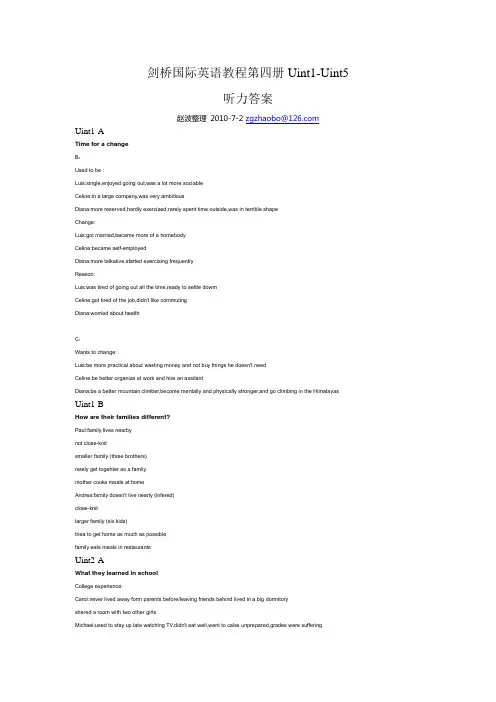
剑桥国际英语教程第四册Uint1-Uint5听力答案赵波整理2010-7-2 ****************Uint1-ATime for a changeB:Used to be :Luis:single,enjoyed going out,was a lot more sociableCeline:in a large company,was very ambitiousDiana:more reserved,hardly exercised,rarely spent time outside,was in terrible shapeChange:Luis:got married,became more of a homebodyCeline:became self-employedDiana:more talkative,started exercising frequentlyReason:Luis:was tired of going out all the time,ready to settle dowmCeline:got tired of the job,didn't like commutingDiana:worried about healthC:Wants to change:Luis:be more practical about wasting money and not buy things he doesn't needCeline:be better organize at work and hire an assitantDiana:be a better mountain climber,become mentally and physically stronger,and go climbing in the Himalayas Uint1-BHow are their families different?Paul:family lives nearbynot close-knitsmaller family (three brothers)rarely get togehter as a familymother cooks meals at homeAndrea:family dosen't live nearly (infered)close-knitlarger family (six kids)triea to get home as much as possiblefamily eats meals in restaurantsUint2-AWhat they learned in schoolCollege experience:Carol:never lived away form parents before/leaving friends behind lived in a big dormitoryshared a room with two other girlsMichael:used to stay up late watching TV,didn't eat well,went to calss unprepared,grades were sufferingWhat they learned form it:Carol:how to get along with others,how to respect other people's opinions and property'how to get along living in tight quartersMichael:how to manege time better,how to be more responsibleUint2-BWhat's their learning strategy?How thay are trying to learn:Frank:study group with the friendsRegina:reading tne manualSonia:taking a class at the community centerProblems they are having:Frank:some people come unprepared,or forget their notes,or don't read the chapter beforehandRegina:too much information to remember,not enough time to study the manualSonia:class is too difficult ,other Ss are better , the teacher is not very good / wanders off the topicUint3-AWhat do you like about the city?City: Deborah:Seoul Todd:Salvador Features: Deborah:one of the ten largest metropolitan areas;cosmopolitan;unique spicy food;noodles,barbecued beef;very old;combination of old and new architecture;efficient subway system;discount shopping Todd:very old;founded by Portuguese;third largest;population of 2 million; built into a cliff;overlokks bay;on two;elevator between levels;beautiful beaches;African influence in music,food,and dance;can watch special kind of dancing;great nightlife;street festivalsUint3-BLife in New York CityQuality-of-life issue:Lindsay:subways on-schedule noise from garbage trucks nightlife:theater and restaurantsEric:cleanliness and safety cold weatherHow do they feel about them:Lindsay:pleased unhappy;they wake her up in the morning excited;wants to do everythingEric:thinks the city has improved in these areas tired of it;ready for a changeUint4-AManaging stressFrequent cause of stress:Lsa:job is hard;has to be organized,disciplined,and self-motivatedSean:traffic,rude driversVictor:demanding doctors,pressured peopleMethod of lowering stress:Lisa:takes a hot bath,watches TV,drinks teaSean;listens to music in car,watches funny movie,goes to friend's houseVictor:goes to gym, goes for a drive in the countryUint4-BI had the widest dream.Dreams:Lucia:back in high school;lost her clas schedule;can't find the main office;late for class;doesn't know what homework she must do;missed an important testRick:in danger but unable to move or scream;in his own bed and senses something coming closer;needs to alert someone,but can't move Meaning:Lucia:she's worried or overwhelmed about something in her lifeRick:not in control of something(once had a dream when one of his children was sick)1.She's 20 and has been sent back to high school with the younger students.2.She has lost her class schedule.3.So she can find out where she is supposed to be .4.Someone or something is coming closer to him with the intention of harming him.5.In his bedroom.6.Warn or save someone.7.One of his children was very sick.Uint5-AHow are they different?Similar:Yashiko:goes to a public high school,wears a uniform,goes to school five and a half days a week,similar interests to friends,plays video games,fan of American movies,likes Brad PittRenato:goes to school from seven until midday,after school studies or plays soccer,on weekends hangs out with friends in shopping centers. Suzanne:worries about grades and getting along with parents goes to classes,attends club meeting,does homework,sleeps late on weekends. Different:Yoshiko:lived outside Japan for six years,learned to speak English while living overseas.Renato:does his own thing ,doesn't always hang out with group,thinks for himselfSuzanne:goes to special school for arts where she studies core subject and music,dance,and artUint5-Bhe different approaches to problem solvingConcerns:Dominique:making expensive purchases;making a mistake and getting stuck with itCarla:hiring the right personWayne:where to spend Christmas holidaysType of problem solver:Dominique :meditative(reads consumer magazines for car ratings,speaks to knowlegeable people in the field,then test-drives the car)Carla:assertive(doesn't like to waste time making decisions,perfers to go with her instincts and act quickly)Wayne:cooperative (talks to a lot of people to get their input,analyze the problem from different people's perspective)。
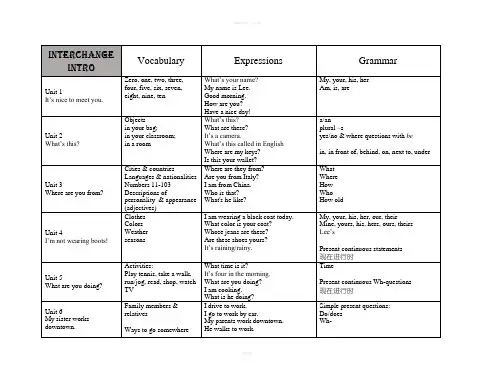

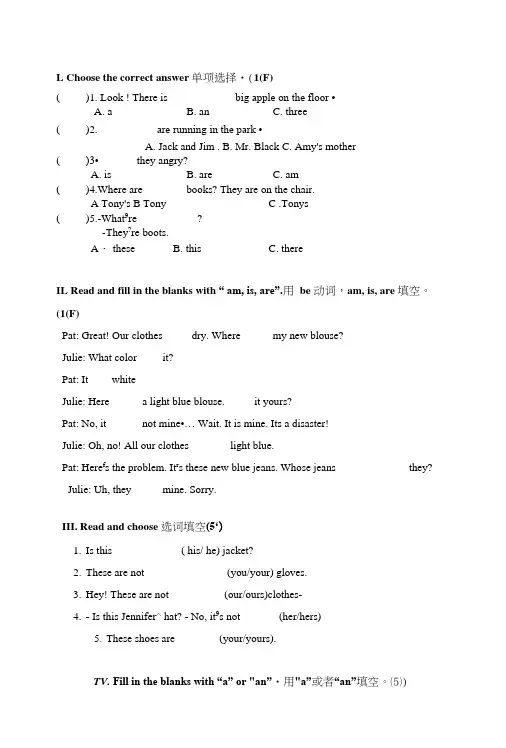
L Choose the correct answer单项选择・(1(F)( )1. Look ! There is ____________ big apple on the floor •A. aB. anC. three( )2. __________ are running in the park •A. Jack and Jim .B. Mr. BlackC. Amy's mother( )3•______ t hey angry?A. isB. areC. am( )4.Where are _______ books? They are on the chair.A Tony'sB TonyC .Tonys( )5.-What9re __________ ?-They?re boots.A・ these B. this C. thereIL Read and fill in the blanks with “ am, is, are”.用be 动词,am, is, are 填空。
(1(F)Pat: Great! Our clothes _____ dry. Where _____ m y new blouse?Julie: What color ___ it?Pat: It ___ whiteJulie: Here _____ a light blue blouse. ____ it yours?Pat: No, it ______ n ot mine•… Wait. It is mine. Its a disaster!Julie: Oh, no! All our clothes _______ light blue.Pat: Here f s the problem. It r s these new blue jeans. Whose jeans ____________ t hey? Julie: Uh, they ____ mine. Sorry.III. Read and choose 选词填空(5‘)1.Is this ____________ ( his/ he) jacket?2.These are not _____________ (you/your) gloves.3.Hey! These are not _________ (our/ours)clothes-4.- Is this Jennifer^ hat? - No, it9s not ______ (her/hers)5.These shoes are _______ (your/yours).TV.Fill in the blanks with “a” or "an”・用"a”或者“an”填空。
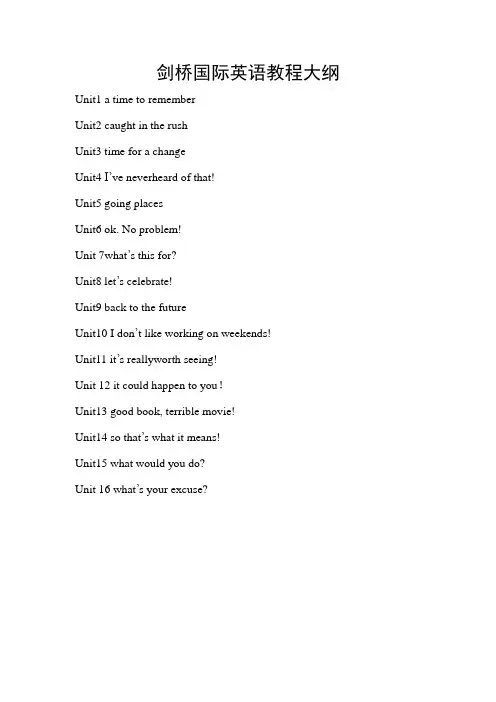
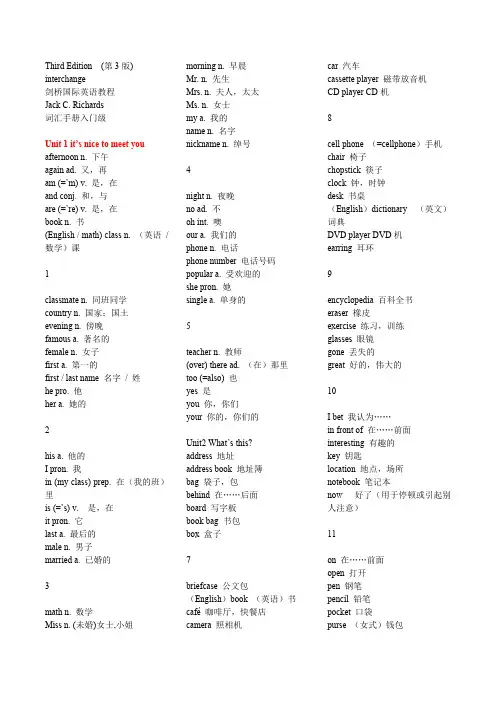
Third Edition (第3版) interchange剑桥国际英语教程Jack C. Richards词汇手册入门级Unit 1 it’s nice to meet you afternoon n. 下午again ad. 又,再am (=’m) v. 是,在and conj. 和,与are (=’re) v. 是,在book n. 书(English / math) class n. (英语/ 数学)课1classmate n. 同班同学country n. 国家;国土evening n. 傍晚famous a. 著名的female n. 女子first a. 第一的first / last name 名字/ 姓he pro. 他her a. 她的2his a. 他的I pron. 我in (my class) prep. 在(我的班)里is (=’s) v. 是,在it pron. 它last a. 最后的male n. 男子married a. 已婚的3math n. 数学Miss n. (未婚)女士,小姐morning n. 早晨Mr. n. 先生Mrs. n. 夫人,太太Ms. n. 女士my a. 我的name n. 名字nickname n. 绰号4night n. 夜晚no ad. 不oh int. 噢our a. 我们的phone n. 电话phone number 电话号码popular a. 受欢迎的she pron. 她single a. 单身的5teacher n. 教师(over) there ad. (在)那里too (=also) 也yes 是you 你,你们your 你的,你们的Unit2 What’s this?address 地址address book 地址簿bag 袋子,包behind 在……后面board 写字板book bag 书包box 盒子7briefcase 公文包(English)book (英语)书café 咖啡厅,快餐店camera 照相机car 汽车cassette player 磁带放音机CD player CD机8cell phone (=cellphone)手机chair 椅子chopstick 筷子clock 钟,时钟desk 书桌(English)dictionary (英文)词典DVD player DVD机earring 耳环9encyclopedia 百科全书eraser 橡皮exercise 练习,训练glasses 眼镜gone 丢失的great 好的,伟大的10I bet 我认为……in front of 在……前面interesting 有趣的key 钥匙location 地点,场所notebook 笔记本now 好了(用于停顿或引起别人注意)11on 在……前面open 打开pen 钢笔pencil 铅笔pocket 口袋purse (女式)钱包Relax. 别担心。
[by:英语听力网||人人论坛||人人听力网][00:00.00]喜欢,就把复制到QQ个人资料中!2.CONVERSATION [00:03.42]A.Listen and practice.[00:06.50]Kathy:Hey,this sounds good--snails with garlic!Have you ever eaten snails? [00:12.80]John;No,I haven't.[00:14.63]Kathy:Oh,they're delicious!I had them last time.Like to try some?[00:20.06]John:No,thanks.They sound strange.[00:23.80]Waitress:Have you decided on an appetizer yet?[00:26.44]Kathy:Yes.I'll have the snails,please.[00:29.81]Waitress:And you,sir?[00:31.19]John:I think I'll have the fried brains.[00:33.83]Kathy:Fried brains?Now that really sounds strange![00:38.24]3.PRONUNCIATION Reduced forms[00:43.15]Listen and practice.Notice how did you and have you are pronounced in these questions[00:50.70]Did you skip breakfast this morning?[00:53.21]Did you cook your own dinner last night?[00:55.98]Have you ever tried Indian food?[00:58.17]Have you ever eaten snails?[01:00.21]4.GRAMMAR FOCUS Simple past vs.present perfect[01:06.93]Simple past:completed events at a definite time in the past[01:12.54]Did you eat snails at the restaurant last night?No,I didn't.[01:17.40]Did you go out for dinner on Saturday?Yes,I did.[01:21.58]I went to a Korean restaurant last week.[01:24.72]Present perfect:events within a time period up to the present.[01:30.15]Have you ever eaten snails?No,I haven't.[01:34.38]Have you been to a French restaurant?Yes,I have.[01:38.14]I've never been to a Greek restaurant.[01:41.38]8.CONVERSATION[01:44.83]A.Listen and practice.[01:48.02]Kate:What's your favorite snack?[01:49.74]Jim:Oh,it's a sandwich with peanut butter,honey,and a banana.It's really delicious![01:55.88]Kate:Ugh!I've never heard of that!How do you make it?[01:59.85]Jim:Well,first,you take two slices of bread and spread peanut butter on them. [02:04.94]Then cut a banana into small pieces and put them on one of the slices of bread. [02:10.40]Finally,pour some honey over the bananas and put the other slice of bread on top.Yum![02:17.30]Kate:Yuck!It sounds awful![02:20.04]9.GRAMMAR FOCUS Sequence adverbs[02:24.82]First,spread peanut butter on two slices of bread.[02:28.85]Then cut a banana into small pieces.[02:32.01]Next,put the pieces of banana on one slice of bread.[02:36.03]After that,pour honey over the bananas.[02:39.16]Finally,put the other slice of bread on top。
Unit 4 What’s in my hat?教学目的和要求Teaching aims and demands 帮助学生进一步巩固单复数的概念,能够用所学的单词进行替换练习学习新句型,复习已经学过的词汇继续学习相关音素,复习已经学过的音素交际用语Expressions in communication This is my friend, Tony.It‟s our fun time today.What‟s in my hat?What‟s on the table?Who can make your own chant?Let me try!重点朗读词汇Key words and expressions a hat, a turtle, a table, a pig, a friend, a clock, a fisha baseball, a bird, a pen, a pouch, Tony, fun, time所需教具Materials for teaching 若干个已经学过的单词图片,尽量以复数形式出现与第二部分及第四部分相关的图片和单词卡片教师可以穿一件风衣,在里面的袋子里放一些东西,用来变魔术如何导入教学?上课时,教师手里拿一顶礼帽,并在礼帽里放一些与本课有关的东西和动物玩具。
进入教室后,教师说:“Hello, boys and girls, guess! What‟s in my hat? What‟s in my hat?” 凡是小朋友猜对的,教师就把东西拿出来,放在桌子上进行展示。
接着,教师说:“Hello! This is my friend, Tony. It‟s our fun time today.”接着,教师转身拿出小丑的图片,并装作小丑跟大家问好。
教师说:“Hello! Good morning! Please watch carefully! What‟s in my hat?” 说着说着,“小丑”就开始从礼帽里往外拿东西。
《剑桥少儿英语》Unit4FreeTime《剑桥少儿英语》Unit4 Free TimeUnit 4Free Time ( 12)Aims:1、Understand and use:swim/play table tennis/play football/play the piano/ride a horse/stand on your head/roller blade.2、Say the sentences:I can (swim/......)I can‘t (stand on your head/......)3、Can you(ski)?Yes,I can./No,I can‘t.4、Sing the song:My sister,my brother and me5、Write about the children.(NO.12)Difficult:Aims 1、2、3、4Focus : 5Teaching Aids : Cards 、 CAI、 Radio、 Tape.Teaching steps:Class begins.T:: Hello,boys and girls.Ss : Hello,Miss Bao.S : Sit down ,please.T:Introduce yourself.Who can try?please come to the front.Step 1:warm-up.1、 T:Let‘s warm-up .Sing a song:Welcome,welcome,welcome back.T:Are you ready?Ss:Yes.Step 2 : Guess.1、T:Now let‘s go on to learn the new lesson:FreeTime.T ogether.Read it.2、T:(CAI) Look ,listen,read and act.S...,S...,S...,........3、T:(CAI)Play:Guess the next one.(Music)S...,S...,S...,.........4、T:Let‘s play:“Miss Bao says”.If I say:Miss Bao says,You can say and act.If I don‘t say :Miss Bao says,You can‘t say and act.If you wrong or slowly,please sit down.Do you know?Ss:Yes.Ss:Winner,Winner,You are winner.Step 3: Sing the song:My sister,My brother and me.1、T,Ss:(Act and sing the song...)2、T:Let‘s play:If you agree ,please sit down.T:Can you play football?.....Ss:Yes, I can.No,I can’t.3、S:I can ...,...,...,and.....S:I can‘t...,...,and......Step 4 Interview with me..1、T:You ask,I answer.Ss:Miss Bao,can you swim/play the piano/.....?T:Yes,I can./No,I can‘t.2、 Say the sentences:Miss Bao can...and...3、She can‘t...and.......4、P 14、 T 12. Write about the children.A、Please do youself.B、In Groups.C、Check the answer.Step 5:The end:Sing the song,My sister,my brother and me .本课课件下载课后记――让学生在活动中学会这节课是Unit 4 Free time的最后一课时,是一节练习课.这个单元是关于自由时间里的10种体育运动项目的学习.这节课的目标;1是要求学生懂得并运用这10种体育项目;2是会说I can....,和I can‘t...;3是对Can you(ski)?会回答Yes,I can./No,I can‘t. 4是会唱,表演歌曲:My sister,my brother and me..5是完成第12题的练习.重点是目标1、2、3、4,难点是目标5.针对这些目标,我做了很多准备工作;10种体育项目的卡片,录好2个音乐磁带,做了精美的多媒体课件.在教学中,首先让几个同学用英语自我介绍,正式上课了,我和全班同学一起热身边唱边表演歌曲:Welcome back.下面通过几个英语游戏突出重点,出示多媒体课件,点学生看体育项目逐一读出单词,并做出相应动作,然后放节奏强劲的音乐让学生猜猜看下一个是什么项目,在课件里我设置了超链接,谁也不知道下一个到底是什么,这就不仅训练了学生的说,也训练了他们的快速敏捷的思维,极大的调动了他们的积极性,并且得到成功的惊喜,猜对了得一个奖品.接着做英语游戏“Miss Bao says...”,我发指令,学生做动作,如果我说了“Miss Bao says...”,学生就要说和做相应动作,师拍一下手就停止动作;如果我没说“Miaa Bao says...”就不能说也不能做动作,这个游戏旨在巩固他们对10种体育项目的掌握,既让练习不单调也训练了学生的反应能力,最后决出优胜者,全班学生竖大拇指拍掌表扬他:Winner,winner,you‘re winner.为了突破难点,首先让学生起立在多媒体背景音乐中一起表演唱歌曲:My sister,my brother and me,旨在复习句型I can...,I can‘t...,he can...,she can...,然后通过游戏“If you agree,please sit down”,(假如你同意就请坐下),我说:Can you...?会的坐下并说Yes,I can,不会的站着后说No,I can’t,这个游戏在训练学生会用能懂10种项目,会说句型,接着让学生问,Can you ...?我答Yes,I can/No,I can‘t.让学生对句子的问和答都进行了训练,对结果进行记载,让学生总结我会什么和不会什么,这就与第12题练习联系起来了,接着水到渠成让学生完成练习,看图写句子,先让他们自己做,再由小组长带头交流,再全班看课件里的正确答案读一读.最后用表演唱这节课的歌曲来结束这节课.在整节课里用多个英语游戏突出训练了重点,突破了难点,建立了灵动的教学课堂,以活动为主,师生互动,采用灵活多样的教学手段,把语言训练放在活动,游戏中,使之趣味化,使学生能在愉悦的氛围中学得愉快,动静结合,让学生在动中学,全方位调动学生的口,脑,耳,四肢,教师节奏快,使学生学得快,反应快,紧紧抓住学生的注意力,让他们既紧张又活泼,激励学生积极参与.这么多体育项目,学生都很感兴趣,原本准备创设真实运动场景,比赛等等,但受到授课地点地方不大的限制,有的体育项目比如滑雪,骑马,游泳,溜冰等无法准备,就无法创设真实情境,因此只真实的表演了打乒乓球.还有本来打算在课的结尾设计为2008年北京奥运会的情境,放《运动员进行曲》让学生会某个项目就代表中国参加奥运会,但在学校没找到这个磁带,就把结尾改为了表演唱英语歌曲.练习中有的比较慢,有的很快做完,这是一个值得探讨的问题,在小组活动就会受到影响,在开展小组活动中,小组长的能力还需培养.《剑桥少儿英语》Unit4 Free Time。